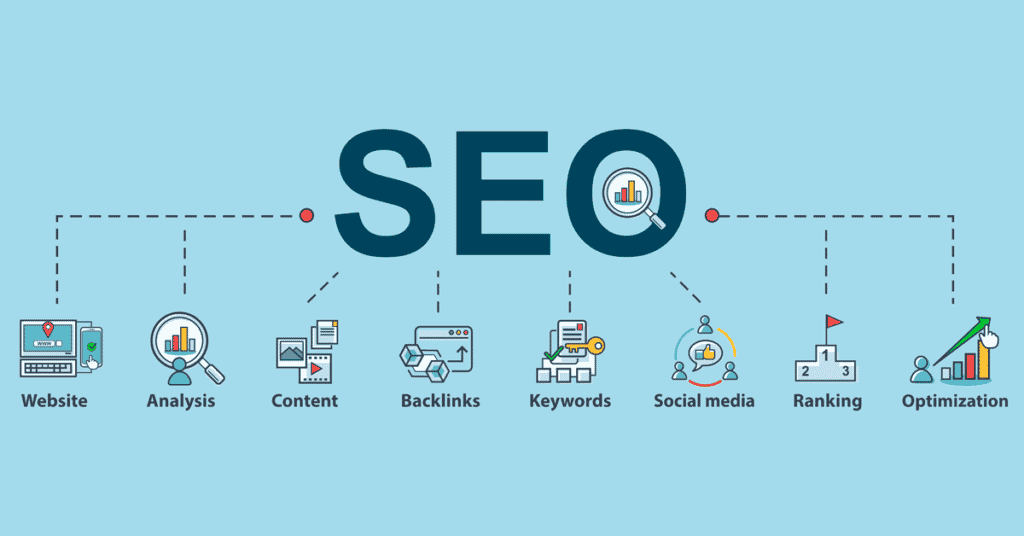Dental SEO: The Ultimate Guide – 2023
Search engine optimization, or SEO, is crucial in most digital marketing strategies. But what does it mean for dentists? In this guide, we’re cracking the code on dental SEO. If you’re a dentist (check) and you want patients to be able to find you on Google (check), stay tuned. In this article, we answer common […]

Search engine optimization, or SEO, is crucial in most digital marketing strategies. But what does it mean for dentists? In this guide, we’re cracking the code on dental SEO.
If you’re a dentist (check) and you want patients to be able to find you on Google (check), stay tuned. In this article, we answer common questions about dental SEO. We also provide strategies for dentists who want to help patients find them on search engines.
The Ultimate Guide to Dental SEO Includes:
- What Does SEO Mean?
- Is SEO worth it for dentists?
- Types of SEO
- Why Local SEO is Important for Dentists
- The Best Dental SEO Strategies
- Does Blogging Help SEO?
- How Else Can I Boost Dental SEO?
Let’s get started!

What does Dental SEO mean?
SEO stands for Search Engine Optimization. SEO includes optimizing a website’s content and online presence to make sure search engines like Google prioritize them when someone types in a query or service. For dentists, Dental SEO is the process of making your dental practice appear higher in search engine results when a user enquires about dental services. If a person in your city were to type “Dentists near me” or “best places for dental implants” into a search bar on Google, Bing, or Yahoo, the website with the best SEO is the one that would come up first on search engine results pages (SERPs).
Remember: Search engines are always trying to serve the best possible answer to their users. That’s why they exist. They don’t like to provide incorrect, outdated, or foggy information. So it’s your job to convince search engines that your website/content is the best out there and they should be showing it to their users on the first results page.
To prioritize a website as a “good” search result, Google needs to understand who a company is, where it’s located, and what it offers. Google likes a website with content that is unique and up-to-date, consistent and useful. Google likes text that is clear, precise and has a clear answer to a user’s question.
As a dental marketing agency, our job is to make sure it’s our dental clients’ websites that are popping up on the first page of Google listings. We use various strategies to help our clients boost their SEO and in this article where are going to share some of the best dental SEO tactics for dentists.
Is SEO worth it?
Absolutely! Google likes to say that it is “organizing the information on the internet.” And it’s true. In a sea of websites, Google needs to sift through and rank the best match for your question, or search query.
As a web user, how often do you dig past the first page of Google results to find what you’re looking for? Probably not very much. That means that it’s extremely important to optimize your dental SEO to ensure potential patients can find you–and not your competitors.
SEO delivers what we call organic traffic. Meaning, you’re not paying for it through ads or sponsorship (even though you can sponsor Google listings with Google Ads. Because search engines are able to match a search query to the best possible answer, leads that come your way via SEO can often be valuable. If a patient sees you have an answer to their problem, question, or need, they are more likely to follow through and book an appointment.

Types of SEO
Before we talk about dental SEO strategies, let’s break down the various types SEO:
On-Page SEO: This includes both the content and the HTML source code of your website. There are ways to optimize the words, images, and source codes on your website pages to help your website outrank competitors.
Off-Page SEO: Off-page SEO includes strategies that you implement outside of your website. Having other credible websites link to yours, creating content that is published elsewhere online, using social media marketing, and collecting reviews on external sites can all help your off-site SEO.
Technical SEO: Technical SEO analyzes your website’s technical performance and how the site is working. Does the site load quickly enough? Is it mobile-friendly? Technical SEO includes technical terms structured data and canonicalization. (And you thought dentistry was complicated!)
Local SEO: Local SEO is the way Google offers location-specific responses. It’s how Google finds a user’s location to offer them restaurants, directions, and (of course) dentists from their area.
The Best Dental SEO Strategies
Now that you know the different types of SEO, the next question is what are the best dental SEO strategies for you? What can you do to increase your rankings on search engines?
Here are some MUST HAVE dental SEO action items we recommend to all of our dental marketing clients.
1.) Update NAP (Name, Address, Phone Number) on Every Page
One of your business’s most important entity signals is your “NAP.” (Name, address, and phone number.) This is Google’s most basic way to look if the business is legitimate, and one of the first things it looks for when it comes to local SEO.
Some tips:
- Your NAP should be clearly displayed on every page of your website. Include it in the footer to make this easier.
- Ensure your business information is correct/consistent. Not just on your website, but for every website you list your details! This is important because Google checks every website across the entire internet to determine how trustworthy your information is. Think of it this way, if somebody gives you a different name, address, or phone number every time you speak to them, you’ll probably get suspicious at some point… An awesome tool to confirm the consistency of your NAP information is BrightLocal. BrightLocal can help you find your listing across various platforms. You can use BrightLocals’s citation tracker free for 14 days here to see what your consistency score is.
- Make sure you’re using a local phone number on your website. This way, Google will favor you for local searches.
2.) Use Keywords
If you’ve heard anything about SEO, you’ve probably heard about keywords. Keywords are the words you include on your website (in text, headings, titles, and descriptions) that are matched to what users are searching for. We will release a blog on how to do strategic keyword research soon, so stay tuned!
Keyword strategy is ever-evolving. It has shifted from “stuffing” articles full of keywords to the point of redundancy to providing clear, helpful answers to common search queries. This is because Google’s AI has evolved and can now see straight through SEO tricks that might have worked in the past.

The most important things to keep in mind here is:
- Choose the right keywords. We use a tool called SEMrush to conduct keyword research. For us, as a dental marketing agency, it helps understand what types of questions dentists ask about marketing. That way, we can make sure to provide thoughtful answers on our website. If you are implementing your own dental SEO to attract new patients, you should do the same. Figure out what potential patients are looking for and use those keyword phrases, words, and answers on your website in a clear way.
- Avoid keyword stuffing. Stuffing keyword after keyword into meaningless articles won’t help your patients understand your services. And, it won’t boost your SEO! Google will actually penalize you for using too many repetitive keywords in articles if they hurt the readability.
- Use keywords strategically. Include keywords in your titles, headlines, and paragraph text. We use a tool called Yoast to help us write articles with focused key phrases. Yoast lets us know if we’ve used the words enough times (but not too many), in the right places, and if our writing will be readable to our audience.
3.) Optimize Meta Descriptions
Meta descriptions are the short text descriptions listed beneath each search result. They help us understand what we’ll find on the website before we click on the result.
You need to optimize them on the back-end of your website. When you write a blog post or create a new page to your website, make sure to fill in the meta description with a brief, clear explanation of what the page is about. Having optimized meta descriptions helps your SEO.
4.) Create a Dental Blog
Blogs are one of the best ways to help your dental SEO. Publishing blogs and sharing them on various social networks can help lead new patients to your website. Learn our tips on how to write a dental blog here.
How Does Blogging Help Dental SEO?
Blogging boosts your SEO quality because search engines are looking to prioritize relevant answers to your patients’ questions. Blogs are the perfect place to provide clear, up-to-date answers to questions like this:
- Do I need dental implants?
- Will my insurance cover Invisalign?
- What are home remedies for toothaches?
- When should my toddler visit the dentist?
Dentists who blog can increase their website’s organic traffic. Google and other search engines will see helpful key phrases, succinct answers, and current information. All of those things together will boost your website’s SEO.
But remember: your blog content isn’t written for bots and algorithms. It should help potential patients solve problems. Read your content out loud before you publish it. Does it sound like a conversation you’re having with a patient when they’re sitting in the dentist’s chair? If so, you’re probably on the right track.
Learn our tips on how to write a dental blog here.

Why local SEO is important for Dentists
All types of SEO should be a part of your search engine optimization strategy. They all work together to help boost your website’s rankings. However, we like to prioritize the importance of local SEO for dentists. Because so many potential patients turn to the internet to find dental practices, it’s crucial your website is one that’s easy to find.
In our recent blog post, Local SEO for Dentists, Tips and Tricks from our Experts to Succeed in 2021, we provide help strategies including:
- Blogging
- Localizing Website Content
- Correcting Practice Information
- Reviews and Reputation
Learn more in the article here.
Here are more tips on improving your local dental SEO:
- Localize your blogs: Post blogs that discuss community news, local events, local interviews the client has had, local event recaps if a client did charity work or attended a function. By writing local, clients will increase their local relevance and show up more and more for local search results relating to their services.
- Include your location on every page: In addition to your NAP, are there ways to write about where you live (organically) on various pages of your website? Maybe you include it in your company’s story on the About page. Perhaps you include areas you serve on your Services page.
- Get involved in your community: By taking part in community news and events and sharing them on your social media or blog, you’re more likely to have external links from local organizations connecting to your website.
- Include your city in Title Tags and Meta Descriptions: The Title Tag is what audiences see in their browser window when they visit your website. It’s the most weighted SEO element on your site. Rather than just including the name of your practice there, customize it to include the city.
How Else Can I Boost Dental SEO?
Achieving strong search engine rankings is both an art and a science. Companies who do it well are constantly creating content, experimenting with new blog topics and keywords, and making updates to their website to earn the honor of a first-page ranking.
More ways to boost SEO include:
- Know your traffic by tracking with Google Analytics
- Set up your Google My Business listing
- Use Alt text on every image on your website
- Create videos or infographics
- Run a site speed test (free online) to see if your pages are loading quickly
- Make sure your website is mobile-friendly
- Use a PPC or paid strategy targeting specific keywords
- Use a PR strategy. Writing articles, being a podcast guest, and speaking to other organizations will improve your SEO with backlinks to your website
Pain-Free Dental Marketing: Dental SEO Company
Feeling S-E-Overwhelmed? That’s where we come in. Let us take SEO off your hands so you can get back to what you do best: dentistry. Pain-Free Dental Marketing is a full-service digital marketing agency helping dental practices reach new patients. We are a Dental SEO expert with Contact us today to learn more about how we can help you boost your SEO, improve your digital presence, and get cheeks in seats.
